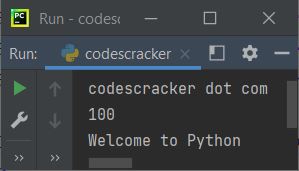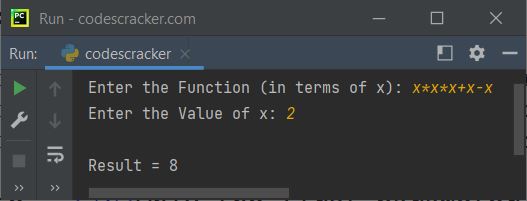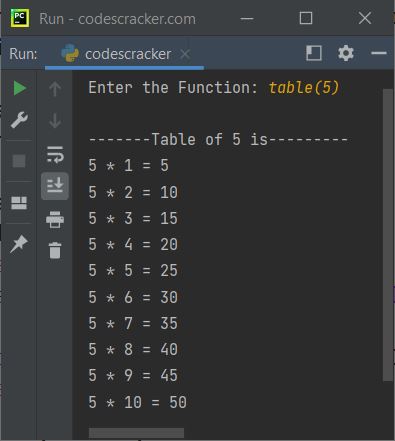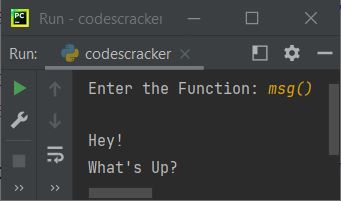- Python Built-in Functions
- Python All Built-in Functions
- Python print() Function
- Python input() Function
- Python int() Function
- Python float() Function
- Python len() Function
- Python range() Function
- Python str() Function
- Python ord() Function
- Python chr() Function
- Python ascii() Function
- Python pow() Function
- Python type() Function
- Python List Functions
- Python list() Function
- Python insert() Function
- Python append() Function
- Python extend() Function
- Python pop() Function
- Python remove() Function
- Python reverse() Function
- Python sort() Function
- Python sorted() Function
- Python Dictionary Functions
- Python dict() Function
- Python update() Function
- Python get() Function
- Python keys() Function
- Python setdefault() Function
- Python fromkeys() Function
- Python items() Function
- Python popitem() Function
- Python Tuple Function
- Python tuple() Function
- Python Set Functions
- Python set() Function
- Python frozenset() Function
- Python String Functions
- Python split() Function
- Python join() Function
- Python format() Function
- Python replace() Function
- Python Iterator Functions
- Python iter() Function
- Python min() Function
- Python max() Function
- Python sum() Function
- Python count() Function
- Python index() Function
- Python copy() Function
- Python clear() Function
- Python next() Function
- Python filter() Function
- Python enumerate() Function
- Python zip() Function
- Python reversed() Function
- Python Number Functions
- Python abs() Function
- Python bin() Function
- Python oct() Function
- Python hex() Function
- Python round() Function
- Python divmod() Function
- Python complex() Function
- Python File Handling Functions
- Python open() Function
- Python read() Function
- Python readable() Function
- Python readline() Function
- Python readlines() Function
- Python write() Function
- Python writable() Function
- Python writelines() Function
- Python close() Function
- Python seek() Function
- Python tell() Function
- Python flush() Function
- Python fileno() Function
- Python truncate() Function
- Python Class Functions
- Python object() Function
- Python property() Function
- Python getattr() Function
- Python setattr() Function
- Python hasattr() Function
- Python delattr() Function
- Python classmethod() Function
- Python staticmethod() Function
- Python issubclass() Function
- Python super() Function
- Python Misc Functions
- Python all() Function
- Python any() Function
- Python isatty() Function
- Python bool() Function
- Python callable() Function
- Python globals() Function
- Python locals() Function
- Python dir() Function
- Python id() Function
- Python isinstance() Function
- Python map() Function
- Python repr() Function
- Python slice() Function
- Python vars() Function
- Python Advance Functions
- Python help() Function
- Python hash() Function
- Python breakpoint() Function
- Python bytes() Function
- Python bytearray() Function
- Python memoryview() Function
- Python compile() Function
- Python eval() Function
- Python exec() Function
- Python Tutorial
- Python Tutorial
- Python Examples
- Python Examples
Python eval() Function
The eval() function in Python is used to evaluate the specified expression. For example:
x = 'print("codescracker dot com")' eval(x) x = "print(100)" eval(x) x = "print(\"Welcome to Python\")" eval(x)
The snapshot given below shows the sample output produced by this Python program, demonstrating the eval() function:

Note: Unlike exec(), that executes dynamically generated code. The eval() function evaluates single dynamically generated expression.
Note: Unlike exec(), eval() only takes a single expression to evaluate.
Python eval() Function Syntax
The syntax of eval() function in Python is:
eval(expression, globals, locals)
where:
- expression - refers to an expression that is going to evaluate
- globals - refers to a dictionary containing global parameters
- locals - refers to a dictionary containing local parameters
Note: Only the first parameter, that is the expression parameter is required. Whereas the other two parameters are optional
Note: The expression parameter is of String type.
Python eval() Function Example
Here is an example of eval() function in Python. This program receives a function in terms of x and then receives the value of x to evaluate the expression with given value of x:
print("Enter the Function (in terms of x): ", end="") expression = input() print("Enter the Value of x: ", end="") x = int(input()) res = eval(expression) print("\nResult =", res)
The sample run with user input x*x*x+x-x as function and 2 as value, is shown in the snapshot given below:

The eval() function in Python, can also be used to evaluate a function. Here is the program:
def msg(): print("\nHey!\nWhat's Up?") def table(num): print("\n-------Table of", num, "is---------") for i in range(1, 11): print(num, "*", i, "=", num*i) print("Enter the Function: ", end="") fun = input() eval(fun)
The sample run with user input table(5) is shown in the snapshot given below:

Here is another sample run with user input msg() as function to evaluate:

Important - Be sure to validate user input, when you're using user input for eval() method, as it may cause some serious issue to your application and related things. Because attacker may gives some harmful command as input to the function.
« Previous Function Next Function »